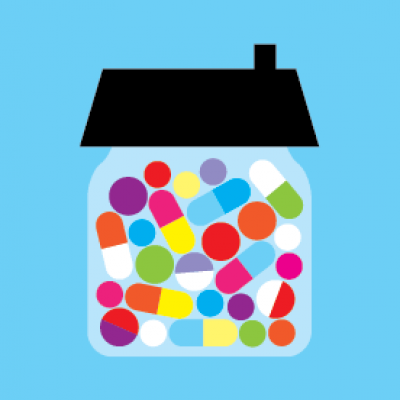After the party: clinical guidance improves care for users of club drugs
27 March 2015

- NEPTUNE developed the first comprehensive guidance on the clinical management of problems caused by club drugs.
- An expert multidisciplinary group of clinicians, service users and other stakeholders was convened to review evidence, draft guidance and test care bundles.
- There has been significant interest in the NEPTUNE project from policy makers at government level.
- A second phase of the project is underway, sharing learning widely through developing educational resources for clinicians.
Identifying a need for guidance
In the UK in 2012-13, one million people are thought to have used club drugs, a group of drugs including novel psychoactive substances (NPS), the so-called ‘legal highs’.
For some people these drugs cause few problems, but others suffer direct or indirect harm, resulting in people attending emergency departments or GPs to seek help. However, clinicians lack knowledge and expertise on how best to treat the problems they see.
As part of our Shine 2012 programme, Central and North West London NHS Foundation Trust hosted the ‘Novel psychoactive treatment: UK network’ (NEPTUNE).
The project was run by a team led by consultant psychiatrist, Dr Owen Bowden-Jones, lead clinician for the trust’s Club Drug Clinic. ‘Having spent most of my career working with people who use alcohol, heroin or crack cocaine, we set up a small clinic to engage people using club drugs,’ he says. ‘We found that people using these newer drugs weren’t engaging with existing drug services, but would engage with a clinic that was specifically for them. As soon as the clinic was set up, we started receiving calls from all over the country from clinicians asking for information. What became clear was that frontline staff had a significant knowledge gap regarding these drugs.’
Harnessing existing expertise
A small number of clinics have shown that when a club drug-orientated service is offered, demand is high. The NEPTUNE project set out to build on the expertise in these clinics by developing a clinical community. The group included professionals from across the UK as well as service users who acted as ‘experts by experience’. It reviewed best available national and international evidence, and drafted guidance.
‘We realised that people using these drugs present not just to drug services but right along the health frontline,’ says Dr Bowden-Jones, ‘so we needed an expert group that included people from A&E departments, sexual health clinics, GPs, clinical toxicologists, representatives of people using the drugs… not just addiction specialists. We cast the net wide and needed that breadth to fill the gaps in knowledge.’
Testing ideas in practice
Setting-specific care bundles were developed for emergency departments, drug treatment services, general practices and sexual health services.
The care bundles were designed to provide an effective way to support busy clinicians and to ensure that treatment is delivered in a consistent and safe manner. Guidelines provided advice on harm reduction, brief interventions, service models, specific groups, psychological and pharmacological treatments and recovery interventions.
The project ran plan, do, study, act (PDSA) cycles to test the bundles. Testing was done on a small scale, focused on two drugs, and had good results.
‘We chose services local to us,’ explains Dr Bowden-Jones. ‘We went to our local A&E and trained staff in how to use the bundles. We were delighted that the bundles were really well received and well used.’
Sharing learning to improve care – NEPTUNE II
The second phase of the NEPTUNE project was launched in early February, and will provide new resources for frontline clinicians across the UK.
‘At the end of phase one, we had developed a 500-page document that offered the most up-to-date evidence and clinical consensus’, says Dr Bowden-Jones. ‘But it is unlikely that an A&E doctor, at 3am, is going to look for what they need in a document that size. It was clear to us that we needed to convert the document into online training and resources for clinicians – it had to be in a format people can really use.’
Hosted by the Royal College of Psychiatrists, with funding from the Health Foundation, NEPTUNE II will deliver an e-learning programme for clinicians and clinical tools on how the harmful effects of club drugs should be managed.
‘We’re in the process of developing the resources now and then we will test them in pilot sites, and evaluate them in terms of clinical utility. This second phase is really where quality improvement comes in – we’re converting a large document into accessible, educational tools for clinicians, with the aim of improving care on a wider scale.’
Influencing policy – the bigger picture
Dr Bowden-Jones was asked to become a member of an expert panel, set up by the Home Office at the end of 2013, to review the legal, health and education framework relating to NPS and recommend ways in which it could be strengthened.
NEPTUNE was discussed at a ministerial summit early in 2014 and was cited as an example of best practice in both the Home Office’s policy paper on UK and international approaches to drug-related behaviour and the final report of the expert review in October 2014.
The official UK government response to the expert review’s report also recognised the importance of the NEPTUNE project, describing it as an ‘example of effective practice in dealing with the harms of NPS’. Public Health England has committed to using its networks and other resources to support the dissemination of NEPTUNE’s findings and advice and will work with NEPTUNE to update the 2007 UK guidelines on the clinical management of drug misuse and dependence in line with its advice.
Further reading
Work with us
We look for talented and passionate individuals as everyone at the Health Foundation has an important role to play.
View current vacanciesThe Q community
Q is an initiative connecting people with improvement expertise across the UK.
Find out more

